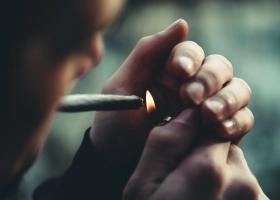What are the effects of addictions on sleep and rest?
It is estimated that we spend a third of our lives sleeping, being during sleep when we can recover both physically and psychologically.
In this article we will see the effects of addictions on sleep and rest, anticipating that all of them affect it in a detrimental way, highlighting a marked lack of rest and insomnia, as well as some imbalances in the different phases of sleep.
- Related article: "The 14 most important types of addictions"
How do addictive disorders affect sleep?
Here we will see a breakdown of the sleep disturbances that addictions promote.
1. Effects of long-term alcohol use on sleep and rest
Today, it is widely known that alcohol is the depressant substance of the central nervous system And, as such, it produces negative effects in people who consume it for a long time at various levels, one of them being rest.
When alcohol is consumed in a timely manner, it has been found that it can even cause drowsiness, in a way that has not been found to cause difficulties for the subject to fall asleep.
Sleep problems appear when alcohol consumption exceeds "reasonable" amounts, since among the studies carried out on the effects of addictions on sleep and rest, alcoholism and its effects on sleep is the subject on which the most studies have been done.
Problems in the sleep phases associated with alcohol consumption
When alcohol is consumed in excess, nocturnal awakenings are common. There is also a decrease in sleep latency, which leads to a mismatch in the duration of sleep. different phases of sleep, so that the REM phase is reached earlier than it should, causing an increase in this phase.
In the case of patients with chronic alcoholism, research has found that they have a less deep sleep and also a shorter duration of REM sleep, as well as more sleep fractional.
In addition, other research has found that excessive alcohol consumption decreases the activity of the EEG. (EEG) during sleep and various brain wave imbalances in the different phases, and sleep may be absent REM.
- You may be interested in: "The 7 main sleep disorders"
Effects of alcohol withdrawal on sleep and rest
In addition to the effects of addictions on sleep and rest, there are also the effects caused by abstinence to them.
When people with alcoholism are trying to stop drinking, this is when the withdrawal syndrome occurs. And during this phase it is common for sleep and rest to be altered, with a high percentage of cases with insomnia.
As they tend to sleep less than necessary, their sleep is even more fragmented; On the other hand, the REM phase and rapid eye movements increase, affecting the latency to reach this last phase of sleep, so that rest is not restorative.
These withdrawal symptoms usually appear between 7 and 48 hours after you have stopped drinking alcohol., presenting the greatest degree of discomfort around 3 days of abstinence; It is common for these symptoms to subside after staying sober for a week, although insomnia could last longer, especially if the person suffers from depression and / or anxiety problems.

- Related article: "When is a person considered to be an alcoholic?"
2. Effects of excessive mobile phone use on sleep and rest
Among the effects of addictions on sleep and rest, it is worth highlighting those caused by the excessive use of mobile phones.
In recent years, addiction to the use of mobile phones and social networks has only increased, being the adolescent population and those in early adulthood, the most vulnerable to this addiction.
That is why numerous studies have been carried out in this regard, highlighting the day-to-day problems caused by these young people by excessive use of their mobile phone, such as poor school performance, anxiety, depression, and insomnia.
Studies have shown that adolescents with a mobile phone addiction tend to have a poorer quality of sleep than those who do not suffer from this addiction; insomnia being one of the main consequences of the abusive use of these devices.
In addition, in these cases, the frequency of eye movements during REM sleep has been reduced, as well as They also present a shortening in sleep latency and an increase in the activity shown in the EEG (EEG). It is because of that their rest is usually not restorative and they have drowsiness in the morning, which can affect their performance.
A study conducted with 400 high school students found a positive correlation between feeling lonely and greater use of mobile phone, as well as another positive correlation between mobile phone use and poorer quality of dream.
- You may be interested in: "Addiction: Disease or Learning Disorder?"
3. Effects of other addictions on sleep and rest
This section will briefly explain the effects of addictions on sleep and rest in those subjects who consume the different substances listed below.
3.1. Cocaine
Cocaine, Being a stimulant of the central nervous system (CNS), it decreases and can even suppress the need to sleep and rest. A person addicted to this substance can suffer a maladjustment in circadian rhythms, so that they do not get enough sleep and, therefore, their sleep is not restorative; waking up drowsy, which could trigger a greater need to consume this stimulant, causing this to become a vicious cycle.
It should be noted that daytime sleepiness is one of the most common symptoms of cocaine withdrawal syndrome, as well as insomnia.
- Related article: "How is the treatment of cocaine addiction?"
3.2. Opioids
Among the effects of addictions on sleep and rest, the damages caused by the consumption of opioids are very significant. These are a group of substances that seriously harm the lives of those who consume any of the drugs classified in that group, such as heroin, including serious disorders in sleep and rest.
Similar to people with a long-term alcohol addiction, people with an opioid addiction have a shorter duration of REM sleep and deep sleep, so it is an addiction that also affects sleep and rest.
In addition, when a person is addicted to this type of substance, he has altered Cardiac rhtyms Furthermore, it has been found that these subjects present altered muscular activity during sleep and move more than normal.
As with other addictions, when trying to get out of opioid addiction, withdrawal symptoms appear, among which insomnia is common, as well as awakenings throughout the night, so that the person does not have a good quality of sleep.
On the other hand, it has been seen that when they are on methadone treatment to maintain opioid withdrawal, they are able to sleep better than in the case of subjects who do not receive its administration and try to remain abstinent without the help of this substance.
- You may be interested in: "Addiction to opiate drugs"
3.4. Cannabis
Cannabis addiction is also not without its negative effects on sleep and rest. Studies with people addicted to cannabis use have found that suffer from decreased REM sleep, as occurs with opioidsAs well as it has also been seen that their sleep is more fragmented, so that they do not get to have a completely restful rest.
When trying to quit cannabis use, it has been found that the majority of subjects suffer from insomnia, among other characteristic symptoms of withdrawal syndrome. In addition, it has also been seen that the duration of the REM phase increases, returning to a correct duration of the different phases of sleep.
Insomnia prevalence in patients addicted to different substances
In a study carried out in Spain by Grau-López et al. In 2016 with 481 patients who had some substance addiction, it was highlighted that 64.3% of them suffered from insomnia, fragmented sleep being also very common (in 49.9% of cases). It was also found that addiction patients with some form of anxiety disorder comorbid disease and an onset of use at an early age were the most likely to suffer from insomnia.
On the other hand, there are studies that highlight that there is a bidirectional relationship between addictions and insomnia, which is why people with sleep problems were found to be more likely to develop some type of addiction to posteriori.
- Related article: "How does self-deception work in addictions?"
Phases of a correct and restful sleep
To better understand the effects of addictions on sleep and rest we are going to see the different phases with their duration of a correct and restorative sleep.
As we have seen, the effects of addictions on sleep and rest have a negative impact on the quality of life of people who suffer from any of them.
We will now see how night sleep should be subdivided to make it restful, consisting of 5 phases, which in turn are classified between REM sleep and non-REM sleep.
The phases that pass from the first to the fourth are those that make up non-REM sleep, while the fifth phase is in which REM sleep occurs.
Phase 1
It is the phase with sleep in a light state, when the subject begins to sleep, which lasts only a few minutes.
The body's activity begins to slow down little by little, and the person may still wake up easily.
Phase 2
In this phase the dream begins to be deeper, lasting between 10 and 20 minutes.
The physiological activity of the body continues to decrease and here the person can still wake up easily, although it would be more complicated than in phase 1.
Phase 3
It is a phase that lasts between 15 and 30 minutes, in which the muscles are in a complete state of relaxation, there is no normal movement of the body or the extremities and it is difficult to wake the person.
Phase 4
This phase usually lasts approximately the same as phase 3, being the deepest stage of sleep, so it is very difficult to wake the person while going through this phase.
Phase 5 or REM sleep
To reach this phase, in a dream that follows a correct course, approximately 90 minutes must have elapsed and its duration is about 20 minutes. At this stage we know rapid eye movements. It is also a stage in which it is relatively difficult to wake the person.



